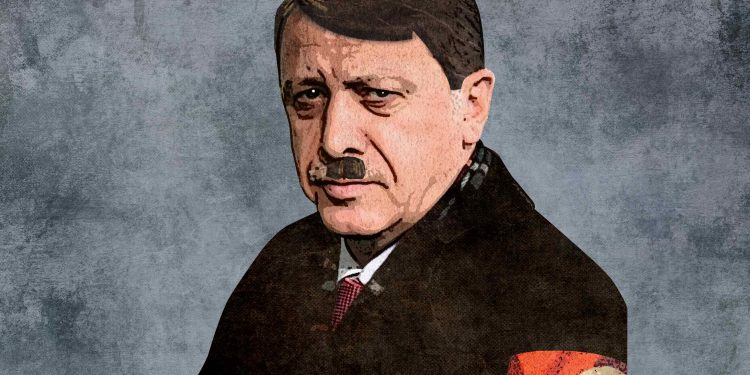CENTRAL NEWS
An article written by a columnist for The Washington Times, Clifford D. May, almsot four years ago could not be more relevant to the current political atmosphere in Turkey’s one-man system today, even when it continues to fall.
Which is better, a parliamentary system or a government headed by a powerful chief executive?
“Turkish President Recep Tayyip Erdogan was asked that question last week,” the writer states. “He replied that he was inclined toward the latter, noting that there are examples in the world that have worked rather well.” As an example, Erdogan points out, “You can see it when you look at Hitler’s Germany.”
“In response to criticism, a statement was issued from his office (which means either from him or one of his factotums). It charged that “Erdogan’s ‘Hitler’s Germany’ metaphor has been distorted by some news sources and has been used in the opposite sense from that intended. The Turkish leader only meant to say that an executive presidency does not require a federal system of government.
It would be unacceptable, the official statement added, to suggest that Erdogan was casting Hitler’s Germany in a positive light. On the contrary, he merely meant to point out that if “the system is abused it may lead to bad management resulting in disasters as in Hitler’s Germany.”
Wait a minute: bad management? That was Nazi Germany’s problem? And the crushing of France, Czechoslovakia and Poland — and the Holocaust — those were “disasters”? Like hurricanes, tornados and earthquakes?
“The important thing,” the statement concluded, “is to pursue fair management that serves the nation.”
From Jihadist Hitler, to Jihadist Erdogan
What may be: the fact that the strongman who has been ruling Turkey for a decade and who is determined to consolidate and increase his power for another decade or two — that’s the reason he was asked about systems of government — doesn’t comprehend the most significant event of the 20th century, doesn’t see totalitarianism and supremacism as singularly threatening, doesn’t get that genocide is an evil without parallel.
There is a historical context here — one about which Erdogan should be aware and acutely sensitive. It starts with this: Hitler regarded Islam as a muscular and manly religion. Christianity, by contrast, he considered “meek” and “flabby.” It would have been better, Hitler once said, had Islamic armies defeated Charles Martel in the 8th century at Poitiers, in what is now France, and gone on to take over Europe because “we should in all probability have been converted” and then “the Germanic races would have conquered the world.”
Hitler also admired the Ottoman Empire, viewing the slaughter of Armenians that began in 1915 as a model and precedent for the genocide he was envisioning. In addition, he and other Nazi leaders adulated Mustafa Kemal Ataturk, the nationalist leader who resurrected a “new Turkey” after the collapse of the Ottomans and the Islamic caliphate — an event due in no small part to their alignment with Germany in World War I. All this and more has been thoroughly documented by Stefan Ihrig for his 2014 book, “Ataturk in the Nazi Imagination.”
Nazi inspirations
Another thread in this tapestry: Erdogan’s close ties with the Muslim Brotherhood, an organization that has “a highly ambiguous relationship with violent extremism,” and whose values run counter to those of Western nations, according to a recent British government study. Hassan al-Banna, founder of the Brotherhood, was a strong supporter of Amin al-Husseini, the mufti of Jerusalem who spent World War II in Germany collaborating with Hitler and broadcasting into the Middle East over Radio Berlin, grafting Nazi anti-Semitism onto the region’s preexisting varieties.
“Al-Banna, too, spoke well of Hitler,” Paul Berman noted in “The Flight of the Intellectuals,” his 2010 book on how Western scholars have chosen to assiduously avoid serious inquiry about those waging jihad against the West. Among the conclusions supported by ample evidence but considered taboo: “Nazi inspirations have visibly taken root among present-day Islamists.”
Slip of the tongue
All this might be dismissed as primarily of academic interest were Turkey just another Middle Eastern backwater. But Turkey is a member of NATO, which makes it, officially, an ally of the United States and Western Europe. Other than the United States, no nation in the alliance has a larger military.
And if Erdogan means to transform Turkey into an increasingly Islamist state under his increasingly authoritarian rule, can we continue to view him as a comrade-in-arms in the war against totalitarianism in its dominant contemporary forms — those espoused by the Islamic State, the Islamic Republic of Iran and al Qaeda?




